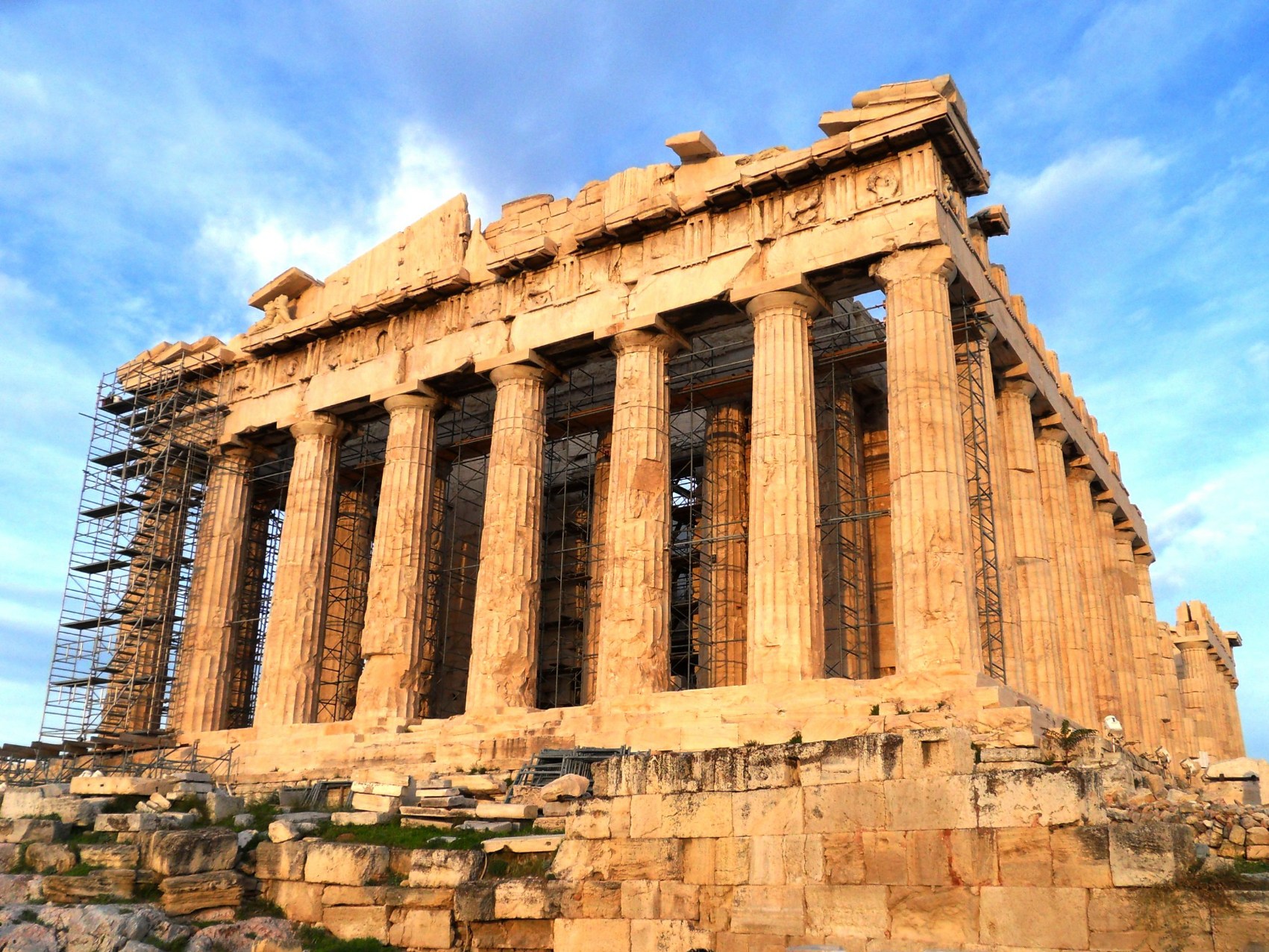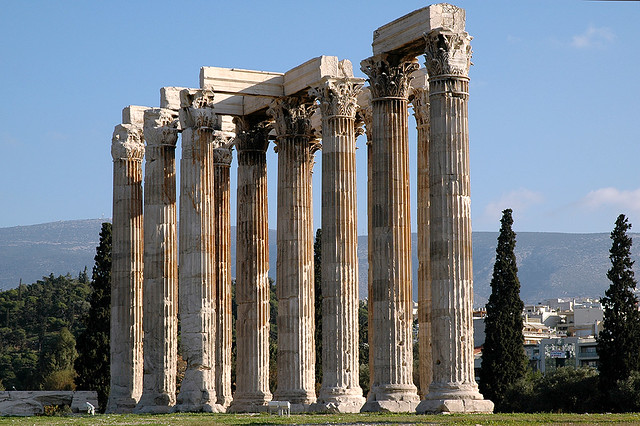Thursday, March 26, 2015
so today we worked on our papers and here is a sneak peak of out thesis :
In Ancient Greece the Gods and Goddesses played an important role in the Greek society. Each Greek God and Goddess was in charge of a different job, they all had their own powers as well. There were the good Gods and Goddesses who stayed together but they also had enemies.If Greece did not have these Gods or Goddesses the world today would be very different.
Wednesday, March 25, 2015
Monday, March 23, 2015
Friday, March 20, 2015
here is some of the notes i took today from all the power points that we presented in class
greek life was
centered around religion
frieze
- a friezeis a long narrow band of sculptures
that run along a boarder
Doric columns are
very sturdy they are very plain
pantheon - temple
for athen parthons
ionic - are much
thinner and more elegant
erectheum ionic
order built between 421 - 405 BC
corinthian columns are seldomly used in
ancient Greece
building began in
the 6th century
The ancient Greeks
built great temples and sanctuaries to their gods
They held festivals
in their honour, with processions, sports, sacrifices and competitions
The picture to the
right is called, Hephaisteion, it is temple in Athens that was built for the
god Hephaistos and the goddess Athena
Thursday, March 19, 2015
- with Hippias gone, Isagoras and Cleisthenes (both were aristocrats - surprise!) engaged in a power struggle
- Isagoras had support from some fellow aristocrats, plus from Sparta
- Cleisthenes had support of the majority of Athenians
- Isagoras becomes archon eponymous (tyrant)
- He ostracizes Cleisthenes
- Cleisthenes’ supporters - and the ordinary Athenian citizens! - revolt against Isagoras’ tyranny
- they trap Isagoras on the acropolis for two days - on the third day he fled and was banished
- 508 BCE ! Yes
- Cleisthenes - definitely a member of the elite
- very rich
- insulated from the “hoi polloi”
- a crafty politician
Wednesday, March 18, 2015
tyrants seize control
- sometimes aristocrats who are on the outside would form alliances with hoplits (well armed soldiers) and set up a alternative form of government called tyranny
- tyrant: someone who rules outside the framework of the polios
modern meaning of tyrant: an abusive or oppressive ruler
- the Greek meaning of tyrant : someone who seized power on their own (usually hoplite help)
clash of the tyrants
- hippias as who ruled form 527 to 510 BCE
- his brother was murdered and his rule became harsh
eventually he was (ostracized)
- in revenge he began working with the Persian king Darius, helping them invade marathon
- sometimes aristocrats who are on the outside would form alliances with hoplits (well armed soldiers) and set up a alternative form of government called tyranny
- tyrant: someone who rules outside the framework of the polios
modern meaning of tyrant: an abusive or oppressive ruler
- the Greek meaning of tyrant : someone who seized power on their own (usually hoplite help)
clash of the tyrants
- hippias as who ruled form 527 to 510 BCE
- his brother was murdered and his rule became harsh
eventually he was (ostracized)
- in revenge he began working with the Persian king Darius, helping them invade marathon
Monday, March 16, 2015
Thursday, March 12, 2015
Wednesday, March 11, 2015
Today we took a quiz in Mr.Schick's class. it was a surprise, I did well I only got 2 wrong and it should help pull up my grade in his class.
we also took some notes:
we also took some notes:
- Greek oral traditions- stories passed on by word of mouth
- homer lived at the end of the "Greek dark ages"
- he composed stories of Trojan war C 750-700 BCE
- the Iliad- probably one of the last conquest of the Mycenaean (the Trojan war)
- the odyssey - Odysseus attempt to return home, being thwarted by the angry God of the sea, P Poseidon
- the odyssey was 12,110 lines of the dactylic hexameter
the Homeric question
- homer may have been mythical creation
- a blind wandering minstrel; and heroic figure
Iliad and Odyssey maybe the culmination of many generations of story telling or... homer actually existed and was just that awesome
Friday, March 6, 2015

- was a classical Greek (Athenian) philosophercredited as one of the founders of Western philosophy.
- Socrates was born circa 470 BC, in Athens, Greece. We know of his life through the writings of his students, including Plato and Xenophon.
- Socrates married Xanthippe, a younger woman, who bore him three sons—Lamprocles, Sophroniscus and Menexenus.
- Athenian law required all able bodied males serve as citizen soldiers, on call for duty from ages 18 until 60.
- ecause these writings had other purposes than reporting his life, it is likely none present a completely accurate picture. However, collectively, they provide a unique and vivid portrayal of Socrates's philosophy and personality.
Thursday, March 5, 2015
The Acropolis

Athens is known as the birth place of democracy when the people of Athens rose up and ruled out the tyrant who had ruled them around 500 BC. The Acropolis is not a single building but a number of temples build on a hill overlooking Athens
Temple of Olympian Zeus

Construction began in the 6th century BC during the rule of the Athenian tyrants, who envisaged building the greatest temple in the ancient world, but it was not completed until the reign of the Roman Emperor Hadrian in the 2nd century AD some 638 years after the project had begun.
Erechtheum

he Erechtheum is an ancient Greek temple of Ionic style on the north side of the Acropolis of Athens. The temple as seen today was built between 421 and 407 BC. The temple is probably most famous for its distinctive porch supported by six female figures known as the Caryatids, who served at supporters.

Athens is known as the birth place of democracy when the people of Athens rose up and ruled out the tyrant who had ruled them around 500 BC. The Acropolis is not a single building but a number of temples build on a hill overlooking Athens
Temple of Olympian Zeus

Construction began in the 6th century BC during the rule of the Athenian tyrants, who envisaged building the greatest temple in the ancient world, but it was not completed until the reign of the Roman Emperor Hadrian in the 2nd century AD some 638 years after the project had begun.
Erechtheum

he Erechtheum is an ancient Greek temple of Ionic style on the north side of the Acropolis of Athens. The temple as seen today was built between 421 and 407 BC. The temple is probably most famous for its distinctive porch supported by six female figures known as the Caryatids, who served at supporters.
Monday, March 2, 2015
- Note the significance of Greece’s location
- Describe Greece’s topography
Look at Greece’s surroundings
- How would all this affect their culture?
The soil is not very good for growing things, there are a lot of mountains that make it hard to walk from one place to another, and there is never enough fresh water. Because of this, people did not settle in Greece as early as they moved to Egypt and the Fertile Crescent.
What bodies of water surround Greece?
Adriatic sea
Aegean sea
What large island is to the south/southeast?
(you may need to go online to find out)
Cyclades island
Describe where Athens and Sparta are located relating to the sea, and to each other
Sparta is at the end of Adriatic sea right on the edge and Athens is right on the edge of Aegean sea
Mesopotamia - Tigris and Euphrates Rivers
Egypt - Nile River
India - Indus River
China - Huang He River
Subscribe to:
Comments (Atom)